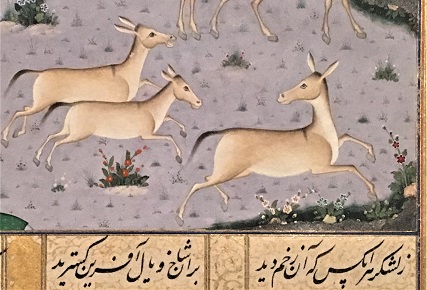Abu ‘Abd Allah al-Ḥusayn ibn Aḥmad ibn al-Jaṣṣaṣ was a superlative individual in several respects. One was his eye for gemstones, in which his connoisseurship was unsurpassed. Another was the opulence of his lifestyle, for which he was called the "Croesus of the Faithful."
[Yaḥya ibn] al-Munajjim sent an epistolary poem to the judge ‘Ali ibn ‘Abd al-‘Aziz with these verses (meter: khafif):
Not everyone endowed with wealth, O Ibn ‘Abd al-‘Aziz,
obliges those endowed with [only] hopes.
Please take away the likes of Ibn al-Jaṣṣaṣ.
Instead, give me the likes of Ibn Barmak.
The verses cost Ibn al-Jaṣṣaṣ his freedom, and a fortune worth 10 million dinars was seized from him. On his release, he saw a hundred camels being led from his estate to the public palace, loaded with bales of canvas. At this he appealed to the caliph's mother, who secured their restoration to him, for she had been much pained by the jeweler's punishment. These camels had just arrived from Egypt, [loaded with two bales apiece,] and the merchandise in each bale was worth a thousand dinars. And on the spot he turned a profit on the confiscated items.
Ibn al-Jaṣṣaṣ kept a selection of precious stones in a compact case that he would reach for any time he was anxious, and revolve them in his chambers until his worries went away. This is what he was doing, in his seat by the pool in his cloistered garden at the time of his arrest, when he leapt up and strewed the stones amid the aromatic plantings.
After his release from carceral inquisition, Ibn al-Jaṣṣaṣ went back to his garden. All the plantings had withered away, but his despair was for the lost stones. Then he began looking around the place, and discovered beneath the withered vegetation that the stones were still there, untouched by human hands, birds' beaks, or the predation of rodents. And as Ibn al-Jaṣṣaṣ gathered up the precious stones, his injured spirits recovered their strength.
From the Book of Precious Stones of al-Biruni








